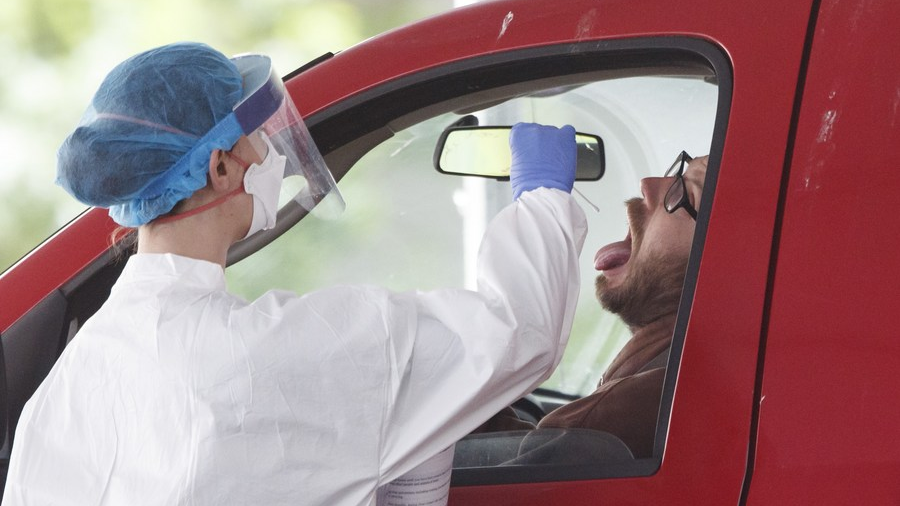Editor's note: Jonathan Arnott is a former member of the European Parliament. The article reflects the author's opinions, and not necessarily the views of CGTN.
The United States has bought 500,000 doses of remdesivir, a drug which is effective in helping some hospitalized patients fight against COVID-19. That represents almost the entire global supply for the next three months.
It's a decision which symbolizes all kinds of problems in a U.S. election year. There's a tendency to announce something big and bold, with the intention of helping the fight against COVID-19.
Currently, confirmed COVID-19 cases are still on the increase in the United States. The situation in New York City, which has seen one of the world's highest death rates, is now under control. However, the virus is spreading rapidly elsewhere - most notably in Texas and Florida - with numerous states not having enacted a full lockdown.
The drug, which should cost less than 10 U.S. dollars for a course according to a report by scientists from the University of Liverpool, published in the Journal of Virus Eradication, will in fact be sold to American patients at the eye-watering price of 2,340 U.S. dollars for a course.
Given existing concerns over inflated prices for medicines in the United States, this pricing will not sit comfortably with many people. Remdesivir is an existing drug being re-purposed to fight against COVID-19: the costs associated with development had already largely been paid.
The drug's manufacturer, Gilead, has at least pledged to permit generic versions of the drug to be produced at lower cost to help developing countries.
The crucial problem, though, is that the U.S. doesn't actually need 500,000 courses of remdesivir. It's an intravenous medication, not available in tablet form, suitable only for some hospitalized patients.
The vast majority of those who contract COVID-19 will neither require nor be given remdesivir. While country acting in its own national interests can sometimes be understandable or even necessary, in this case supplies of a life-saving treatment could find themselves part of an unused stockpile in American hospitals - whilst other countries cannot get hold of the treatment themselves.
Even those who hold to the "America First" doctrine of the current U.S. administration should pause to reflect - this decision goes far beyond merely putting American citizens first.
The decision will cost many lives elsewhere in the world, but it's far from clear that even a single American life would be saved by the decision to order too much at the expense of other nations.

A medical worker takes a swab sample at a COVID-19 drive-thru testing site in Washington D.C., the United States, May 19, 2020. /Xinhua)
A medical worker takes a swab sample at a COVID-19 drive-thru testing site in Washington D.C., the United States, May 19, 2020. /Xinhua)
Professor Gino Martini, the chief scientist of the Royal Pharmaceutical Society, said "The U.S. action means clinical supply chains will be under strain. It will be down to manufacturers Gilead to boost production in order to satisfy demand for the use of remdesivir."
Another problem is the almost-exclusive U.S. focus upon remdesivir: death rates in the United Kingdom have dropped dramatically through use of the steroid dexamethasone. Neither drug is particularly beneficial in the early stages. They don't keep people out of hospital in the first place, but using dexamethasone and remdesivir gives a much better chance of saving lives.
There is also a need to be cautious with the effectiveness of remdesivir. According to a report by FierceBiotech, a media specialized in the field of biotech, the truth is that remdesivir is not an effective Ebola drug, rather, it failed in comparison to rivals in the trials, leading its fight against Ebola to a halt.
It's not an exclusively American problem: there has also been criticism of the UK for restricting the export of dexamethasone (to prevent bulk-buying by companies seeking to re-sell for a huge profit), but the reasoning behind the U.S. government's action on remdesivir is substantially worse.
What do we expect will happen once a vaccine becomes available? We don't yet know which of the many vaccine candidates will prove to be the most effective. We'll need a global supply in a short space of time.
Suppose that the vaccine is developed elsewhere in the world. Will countries now be reluctant to share their supply with America? If it's developed in the U.S., how sure are we that other countries will not be left waiting for many months? Faced with a crisis on a global scale, good will and neighborly behavior is necessary for the world to overcome this.
Relations between the U.S. and the rest of the world will be significantly harmed as a result of it stockpiling remdesivir. Perhaps, to the current administration, that is a problem for the future - with an election just four months away, their focus is clearly and specifically upon the U.S. alone. Building relations overseas will become important to them again, but perhaps not until after November's election.
(If you want to contribute and have specific expertise, please contact us at opinions@cgtn.com.)